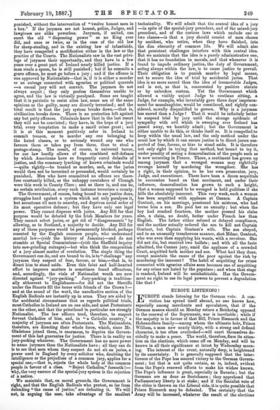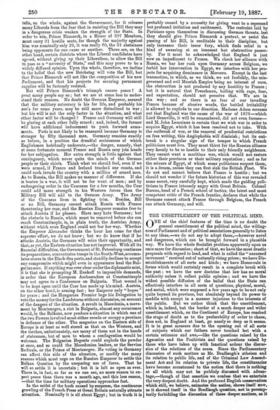EUROPE LISTENING!
-LT:MOPE stands listening for the German vote. A con- ' viction has spread itself abroad, no one knows how, especially among merchants and speculators, that if the German masses should on Monday return a Reichstag opposed to the renewal of the Septennata, war is inevitable ; while if the majority is in favour of that Bill, Prince Bismarck and the Hohenzollern family—among whom the ultimate heir, Prince William, a man now nearly thirty, with a strong and defined character, is too often overlooked—will exert themselves de- cidedly to make a peace. The world, therefore, fixes its atten- tion on the elections, which come off on Monday, and will be known in all their significance at latest by Wednesday morn- ing. The interest of the event, naturally deep, is heightened by its uncertainty. It is generally supposed that the inter- ference of the Pope has assured victory to the German Govern- ment; but that is not quite certain, as is, indeed, evident from the Pope's renewed efforts to make his wishes known. The Pope's influence is great, especially in Bavaria ; but the Germans are as dour as Seotchmen ; they apprehend that Parliamentary liberty is at stake; and if the Socialist vote of the cities is thrown on the Liberal side, it is quite possible that Prince Bismarck may be defeated. The certainty that the Army will be increased, whatever the result of the elections
tells, on the whole, against the Government, for it releases many Liberals from the fear that in resisting the Bill they may in a dangerous crisis weaken the strength of the State. In order to win, Prince Bismarck, in a House of 397 Members, must carry 31 hostile seats, for though the majority against him was nominally only 29, it was really 60, the 31 abstainers being opponents for one cause or another. There are, on the ether hand, certain districts where the Liberal candidates have agreed, without giving up their Liberalism, to allow the Bill to pass as a "necessity of State," and this may prove to be a widely diffused opinion. Upon the whole, therefore, we incline to the belief that the new Reichstag will vote the Bill, but that Prince Bismarck will not like the composition of his new Parliament, and that his projects for securing permanent supplies will be furiously resisted.
But will Prince Bismarck's triumph ensure peace? A great many people say so ; but we are at some loss to under- stand their reasons. No doubt the German Emperor, assured that the military autocracy is his for life, and probably his Ion's for some years, may be still more disinclined to war ; but his will is not the only factor in the situation, and what other factor will be changed ? France and Germany will still be glaring at each other fully armed ; and, indeed, the former will have additional inducement to push forward arma- ments. Paris is not likely to be reassured because Gerratmy is stronger by fifty thousand men. Germany remains exactly as before, in a position the dreadful seriousness of which Englishmen habitually underrate,—the danger, namely, that at some fortunate moment France -and Russia may join hands for her subjugation. Her extra strength is little against that contingency, which never quits the minds of the German people or their chiefs. Think -what we should feel, even if we were armed, if France and Ireland touched our coasts, and oonld each invade the country with a million of armed men. As to Russia, the Bill makes no manner of difference. If she in beaten in a war, it will not be for want of men ; and by endangering order in the Caucasus for a few months, the Czar could add more strength to his Western forces than the Military Bill will add to the German Army. The Army of the Caucasus lives in fighting trim. Besides, Bill or no Bill, Germany cannot attack Russia with France threatening her rear, and the Russian Emperor remains free to attack Austria if he pleases. -Slays may hate Germans ; but the obstacle to Russia, which must be removed before she can reach Constantinople, is, in plain truth, -the Austrian Army, without which even England could not bar her way. Whether the Emperor Alexander thinks the hour has come for that supreme effort, we do not know ; but we do know that if he attacks Austria, the Germans will seize their opportunity, and that, as yet, the Eastern situation has not improved. With all its financial difficulties, the Government of St. Petersburg continues its preparations, concentrates troops in the South-West, accumu- lates stores in the Black-Sea ports, and steadily declines to accept any compromise which might even in appearance heal the Bul- garian sore. If anything was ever clear under the diplomatic mist, it is that she is prompting M. Zankoff to impossible demands, in order that the European Ambassadors at Constantinople fin), not agree to a Conference on Bulgaria. That wound is to be kept open until the Czar has made up his mind. Austria, on the other hand, is arming fast ; her Emperor only " hopes " for peace ; and the Hungarian Premier begs his Delegation to vote the money for the Landsturm without discussion, on account of the dangers of the situation. A revolt in Macedonia, a move- ment by Montenegro, a riot in Bulgaria, almost any occurrence would, in the Balkans, now produce a situation in which one of the two Powers involved must either recede or occupy a province in defiance of the other. The magazine on the Eastern side of Europe is at least as well stored as that on the Western, and the torches, unfortunately, are many of them not in the hands of statesmen, but of men to whom a conflagration would be welcome. The Bulgarian Regents could explode the powder at once, and so could the Macedonian leaders, or the Servian Radicals, or the Prince of Montenegro. No voting in Germany earn affect this side of the situation, or modify the many seasons which must urge on the Russian Emperor to settle the Balkan Question by the unsparing use of force. That he will Bo settle it is uncertain ; but it is left as open as ever. There is, in fact, so far as we can see, no more reason to ex- pect peace than there was a month.ago, and this less reason, —that the time for military operations approaches fast.
In the midst of the bush caused by suspense, the continuous growling of the French Press at Great Britain naturally attracts attention. Nominally it is all about Egypt ; but in truth it is probably caused by a necessity for giving vent to a repressed but profound irritation and excitement. The restraint laid by Parisians upon themselves in discussing German threats, lest they should give Prince Bismarck a pretext, or assist the passing of his Bill, is creditable to their discipline, but only increases their inner fury, which finds relief in a kind of swearing at an innocent but obstructive passer- by. For it must be aoknowledged that England is just now an impediment to France. We check her alliance with Russia, we bar her rush upon Germany across Belgium, we forbid her intervention in Egypt, we interfere with her pro- jects for acquiring dominance in Morocco. Except in the last transaction, in which, as we think, we act foolishly, the mis- governed and evil Moorish Empire being no interest of ours, the obstruction is not produced by any hostility to France ; but it is natural that Frenchmen, boiling with rage, fear, and expectation, should not perceive that. We are in the way ; and as there is no fear of our invading France because of abusive words, the bottled irritability is allowed to explode in our direction. Madame Adam screams out that England was the canoe of the war of 1870—which Lord Granville, it will be remembered, did not even foresee— and M. John Lemoinne is certain that we wish war in order to acquire Egypt, which it has been resolved not to take. With the outbreak of war, or the removal of prudential restrictions on free writing, this Anglophobia will diminish ; but its out- break is a singular sign of the temper in which French politicians must live. They must thirst for the Russian alliance very keenly to be so hostile to their only friendly neighbours. They cannot want a maritime war, which would not restore either their provinces or their military reputation ; and as for the seizure of Egypt, of which some politicians suspect them, it is a dream, unless they can first sink the British Fleet. We do not and cannot believe that France is hostile; but we should not wonder if the future historian of this war revealed some secret, very carefully kept, which made the guiding poli- ticians in France intensely angry with Great Britain. Colonel Bureau, head of a French school of tactics, the latest and most competent critic of the French frontier, declares that while the Germans cannot attack France through Belgium, the French can attack Germany, and will.



































 Previous page
Previous page